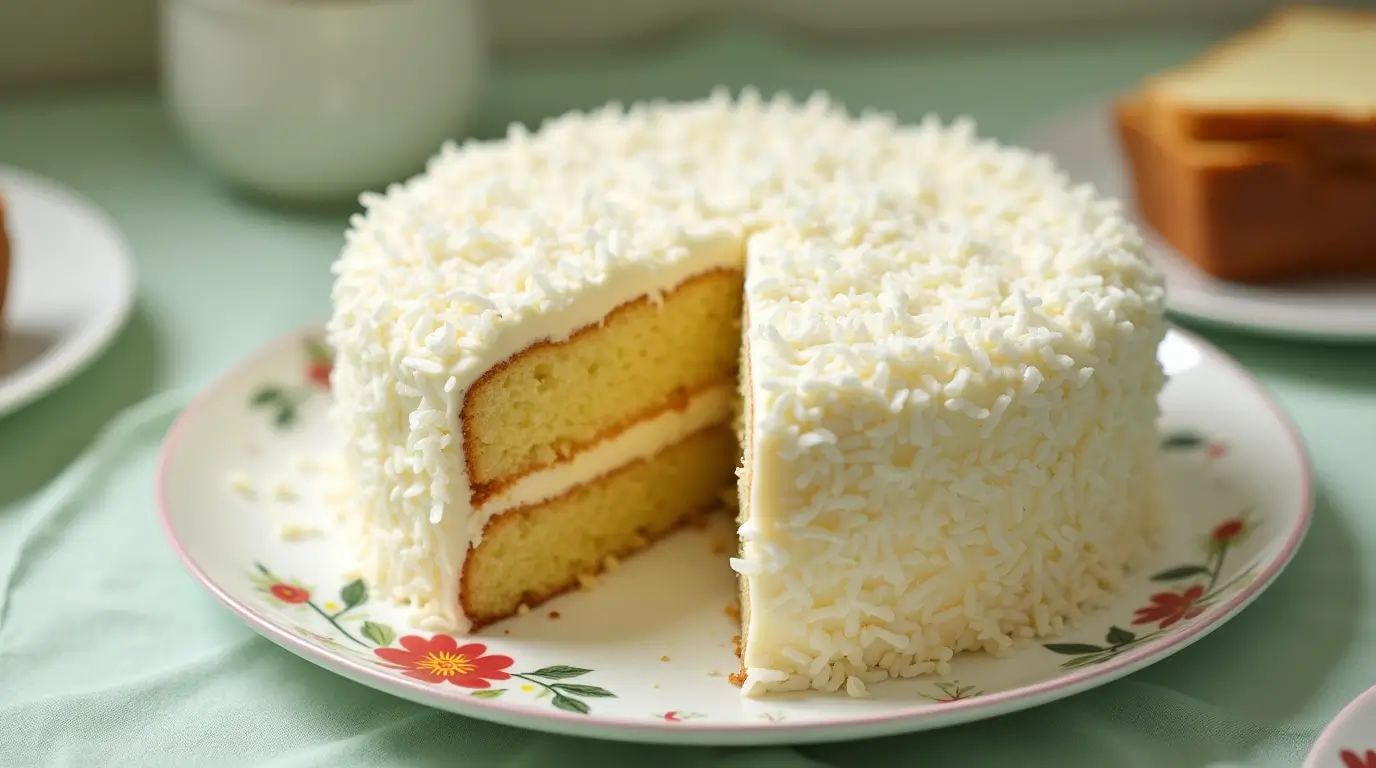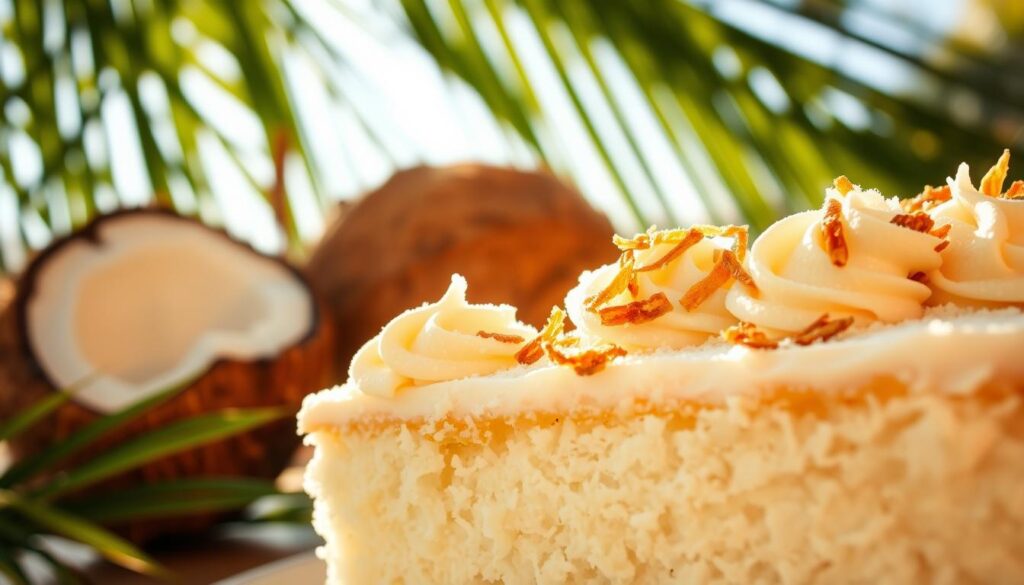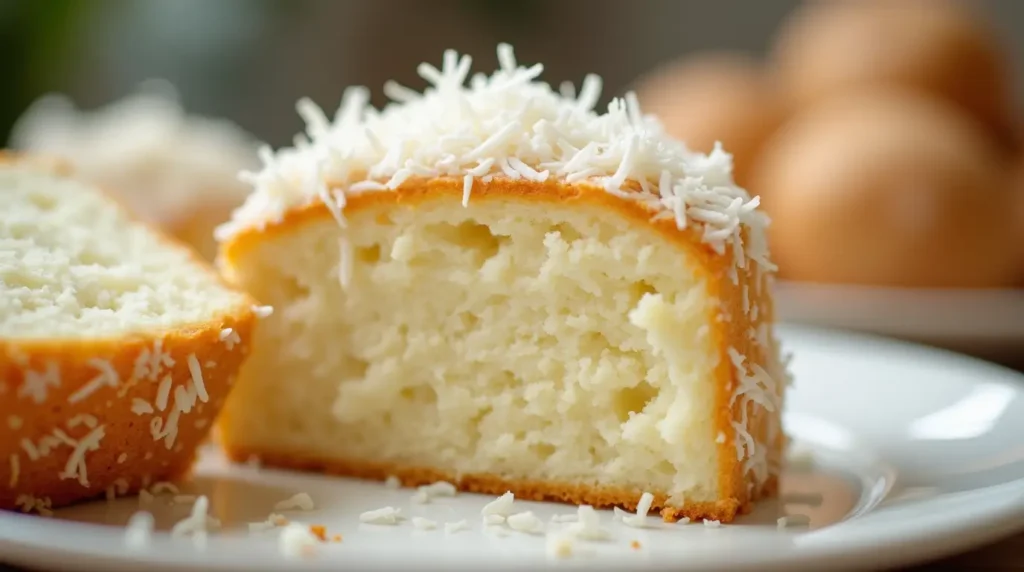Sweet and Simple Coconut Cake Recipe

Imagine stepping into a cozy kitchen filled with the scent of a coconut dessert baking. The cake’s soft texture and creamy taste make you crave it. You’re about to make this simple recipe.
Making this delicious treat is surprisingly easy. With a few ingredients and simple steps, you’ll soon enjoy a moist easy recipe.
Table of Contents
The Magic of Coconut Cake
This Recipe takes you to a tropical paradise with every bite. It has won many hearts. Its fame comes from several key reasons.
Why Coconut Cake Is a Beloved Classic
Coconut cake is a timeless favorite. Its moist texture and rich flavor make it stand out. Full-fat canned coconut milk is key to its moist and tasty nature.
What Makes This Recipe Special
This coconut cake recipe is unique. It combines simple yet high-quality ingredients with careful preparation. Full-fat canned coconut milk adds a special richness and moisture.
The recipe’s focus on detail ensures a best cake. It’s both delicious and looks great.
Essential Ingredients for the Perfect Coconut Cake
To make the perfect cake, you need the right ingredients. These ingredients make your cake both tasty and moist. The mix of ingredients is key for the right texture and flavor in your homemade cake.
Dry Ingredients You’ll Need
The dry ingredients are the base of your coconut cake. They include flour, sugar, and more.
All-Purpose Flour and Alternatives
All-purpose flour is a must in cake recipes, like coconut cake mix. You can try cake flour for a lighter cake or whole wheat flour for a nuttier taste.
Sugar Types and Substitutes
Granulated sugar is common, but brown sugar adds depth. You can also use natural sweeteners like honey, adjusting the amount as needed.
Wet Ingredients for Moisture
Wet ingredients are crucial for your cake’s moisture and richness. They include eggs, butter or oil, and coconut products.
Full-fat canned coconut milk boosts your cake’s moisture, as many coconut cake recipe with cake mix suggest.
Coconut Products Explained
Coconut products give your cake a unique flavor and texture. Knowing the differences is important for the best result.
Coconut Milk vs. Cream of Coconut
Coconut milk adds moisture, while cream of coconut gives a richer coconut taste.
Types of Coconut Flakes
Coconut flakes come in sizes and can be toasted or not. They add texture and flavor to your homemade cake. Pick the right type for your recipe.
Kitchen Tools and Equipment
Having the right kitchen tools is key for making a tropical cake that tastes great and looks good. You’ll need some basic equipment that every baker should have.
Basic Tools Every Baker Needs
You can’t bake a coconut layer cake without the right tools. You’ll need a mixing bowl, measuring cups, a whisk, and a rubber spatula. These tools help you measure ingredients right and mix your batter well. A 9-inch round cake pan is also essential for baking a standard-sized coconut birthday cake.
Optional Equipment for Professional Results
For a more professional finish, think about getting optional equipment. A stand mixer can make mixing easier, and a cake turntable makes decorating simpler. You can also use a coconut flaker or a food processor to shred coconut flakes freshly.
Step-by-Step Coconut Cake Batter Preparation
Making a delicious cake starts with the batter. We’ll show you how to do it step by step. To get the best recipe, follow these steps carefully. This will make your cake moist and full of flavor.
Step1: Measuring and Mixing Dry Ingredients
Start by accurately measuring your dry ingredients. This includes flour, sugar, baking powder, and salt. Use a digital scale for the best results. In a big mixing bowl, whisk these ingredients together until they’re well mixed.
Step2: Combining Wet Ingredients
Next, mix your wet ingredients in another bowl. This includes eggs, butter, coconut milk, and vanilla extract. Make sure to use full-fat coconut milk for the best taste and moisture. Beat these ingredients until they’re smooth and well mixed.
Step3: Proper Folding Techniques
To mix the wet and dry ingredients, use a folding technique. This helps keep the batter light. Gently add the wet ingredients to the dry ingredients and fold until just combined. Don’t overmix, as this can make the cake dense. You want to keep the batter airy for a moist cake.
Step4: Final Batter Consistency Check
After mixing, check the batter’s consistency. It should be smooth and without lumps. If needed, stir it gently. Your batter is now ready to go into your prepared pans. You’re one step closer to enjoying your best coconut cake recipe.
Baking Your Coconut Cake to Perfection
Now that you’ve mixed your recipe batter, it’s time to bake it. Baking is key and needs focus on temperature, timing, and checking if it’s done.
Oven Temperature and Timing
Heat your oven to the right temperature, usually 350°F (175°C). The baking time varies by cake size. For standard round cakes, check the recipe for the right time, usually 25-35 minutes.
- Make sure your oven is at the correct temperature.
- Place your cakes in the middle rack for even baking.
- Watch your cakes closely since oven temperatures can differ.
Testing for Doneness
To see if your recipe is done, stick a toothpick into the center. If it comes out clean or with a bit of moist crumb, it’s ready. Avoid overbaking to keep your homemade cake moist.
Tips for the perfect bake:
- Don’t open the oven door too often to keep the baking steady.
- If baking multiple cakes, make sure they’re spread out evenly.
Cooling Process
After baking, take the cakes out of the oven and let them cool in the pans for a few minutes. Then, move them to a wire rack to cool completely. This step is key to avoid a soggy or off-flavored cake.
Creating the Ultimate Coconut Cake Frosting
This recipe isn’t complete without a rich, creamy frosting. The right frosting can make your coconut dessert unforgettable.
Classic Coconut Buttercream Recipe
A classic choice for cake, buttercream frosting is both rich and versatile. To make it, you’ll need:
Ingredients List
- 1 cup unsalted butter, softened
- 2 cups powdered sugar
- 1/2 cup coconut cream
- 1 teaspoon vanilla extract
- Pinch of salt
Mixing Instructions
Beat the softened butter until creamy. Then, add the powdered sugar slowly, beating until smooth. Mix in the coconut cream, vanilla extract, and salt until fully incorporated.
Cream Cheese Coconut Frosting Alternative
For a tangier frosting, try a cream cheese coconut frosting. It balances the sweetness of the coconut cake, making it a best recipe.
Whipped Coconut Topping Option
For a lighter frosting, choose a whipped coconut topping. Whip heavy coconut cream with sugar and vanilla until stiff peaks form. It’s great for a dairy-free or less sweet option.

Whether you pick a classic buttercream, a tangy cream cheese frosting, or a light whipped coconut topping, your ina garten coconut cake-inspired dessert will impress.
Decorating Your Homemade Coconut Cake
Decorating your homemade cake lets you get creative and add a personal touch. The decoration not only makes the cake look better but also brings out the flavors you’ve worked on.
Toasted vs. Fresh Coconut Flakes
Choosing between toasted or fresh coconut flakes is a big decision for garnishing your cake. Toasted flakes have a rich, nutty flavor and a crunchy texture. They add depth to your cake. Fresh flakes, on the other hand, have a light, tropical taste that’s refreshing.
| Coconut Flakes Type | Flavor Profile | Texture |
|---|---|---|
| Toasted | Rich, Nutty | Crunchy |
| Fresh | Light, Tropical | Soft |
Creative Garnishing Ideas
To make your coconut layer cake pop, try creative garnishing ideas. Use edible flowers or colorful sprinkles for a splash of color. Or, arrange toasted flakes in a pattern or around the cake’s edge for a beautiful, tropical touch.
Professional Finishing Touches
For a tropical coconut cake that looks as good as it tastes, add professional touches. Use a turntable to display your cake elegantly. Or, apply a thin layer of glaze for a glossy finish. The goal is to make the cake look great without hiding its natural flavors.
Troubleshooting Common Coconut Cake Problems
Making a moist cake can be tricky. But, knowing how to fix common problems can help. Issues like dryness, frosting problems, and texture issues can happen.
Fixing a Dry Cake
A dry cake usually comes from overbaking or bad storage. Make sure to bake it for the right time. Store it in an airtight container. Storing it in the fridge can dry it out, so keep it at room temperature if you can. You can also moisten the cake with a simple syrup.
Preventing Frosting Issues
Frosting problems can be fixed by using the right mix and letting butter and cream cheese warm up. Beating the frosting well helps get the right consistency.
Addressing Texture Problems
Texture issues like a dense or crumbly cake often come from mixing too much or too little. Overmixing makes it dense, while undermixing makes it crumbly. Make sure to fold in coconut flakes and other ingredients right for a fluffy texture.

| Problem | Solution |
|---|---|
| Dry Cake | Store in airtight container, avoid fridge storage, brush with simple syrup |
| Frosting Issues | Use right ingredient ratio, ensure ingredients are at room temperature, beat frosting sufficiently |
| Texture Problems | Avoid overmixing, properly fold in coconut flakes |
Delicious Variations of Coconut Cake
Coconut cake can be made in many tasty ways. You can try different ingredients to make unique flavors. These will excite your taste buds and wow your loved ones.
Tropical Coconut Cake with Pineapple
Adding pineapple to coconut cake makes it tropical. The pineapple’s sweetness pairs well with coconut, making it moist and tasty. Just mix in crushed pineapple and top with pineapple frosting. Add toasted coconut flakes for extra taste and texture.
Tips for the best tropical coconut cake: Use fresh pineapple for the best taste. Adding a bit of coconut extract can also boost the coconut flavor.
Chocolate Coconut Cake Fusion
Chocolate lovers will love coconut cake with dark chocolate. Add cocoa powder or melted chocolate to the batter for a chocolatey taste. Top it with coconut buttercream frosting for a perfect mix.
Why it works: Dark chocolate’s bitterness balances coconut’s sweetness, creating a great flavor contrast.
Coconut Cake with Lime or Lemon
Adding lime or lemon zest to coconut cake batter adds a bright citrus flavor. This citrus cuts through coconut’s richness, making the cake feel lighter and fresher. Brushing the cake layers with citrus-infused simple syrup can enhance this.
| Variation | Key Ingredient | Flavor Profile |
|---|---|---|
| Tropical Coconut Cake | Pineapple | Sweet, tropical, moist |
| Chocolate Coconut Cake | Dark Chocolate | Rich, decadent, chocolatey |
| Citrus Coconut Cake | Lime or Lemon Zest | Bright, citrusy, refreshing |
Conclusion: Enjoying Your Homemade Coconut Cake
Now that you’ve mastered the easy coconut cake recipe, it’s time to indulge in the fruits of your labor. This coconut dessert is perfect for special occasions like weddings, birthdays, or holidays. It’s also a great treat to brighten up an ordinary day.
Your homemade cake is a delicious way to transport yourself to a tropical paradise. The combination of moist cake, creamy frosting, and toasted coconut flakes is sure to satisfy your sweet tooth. It leaves you wanting more.
Feel free to experiment with different variations, such as adding pineapple or chocolate to create a unique flavor profile. Whatever your preference, this cake recipe is sure to become a staple in your baking repertoire. So go ahead, slice a piece, and enjoy the delightful taste of your homemade cake.
FAQ
What is the best type of coconut milk to use in a coconut cake recipe?
Full-fat canned coconut milk is the best choice for flavor and texture in your coconut cake.
Can I use coconut cake mix instead of making it from scratch?
Yes, coconut cake mix is a quick option. But making it from scratch gives you more control over the ingredients and taste.
How do I prevent my coconut cake from becoming dry?
To avoid a dry cake, use the right amount of coconut milk. Also, don’t overbake it.
What are some creative ways to decorate a coconut cake?
Decorate with toasted or fresh coconut flakes. Adding tropical fruits or edible flowers can also give it a professional look.
Can I make a coconut cake with other flavors like chocolate or pineapple?
Yes, you can try different flavors like chocolate or pineapple to make unique coconut cakes.
How do I store leftover coconut cake?
Keep leftover coconut cake in an airtight container. Store it at room temperature or in the fridge to keep it fresh.
What is the difference between cream of coconut and coconut cream?
Cream of coconut is sweetened and used in frostings. Coconut cream is the thick cream from full-fat coconut milk.
Can I make coconut cake ahead of time?
Yes, bake coconut cake layers ahead. Then, store them in the freezer until you’re ready to frost and assemble the cake.
How do I achieve a moist coconut cake?
Use full-fat coconut milk and don’t overmix the batter. Baking at the right temperature also helps.
What type of frosting goes well with coconut cake?
Coconut buttercream, cream cheese coconut frosting, or whipped coconut topping are all great choices for coconut cake.
How did you like the recipe?
There are no reviews yet. Be the first one to write one.
